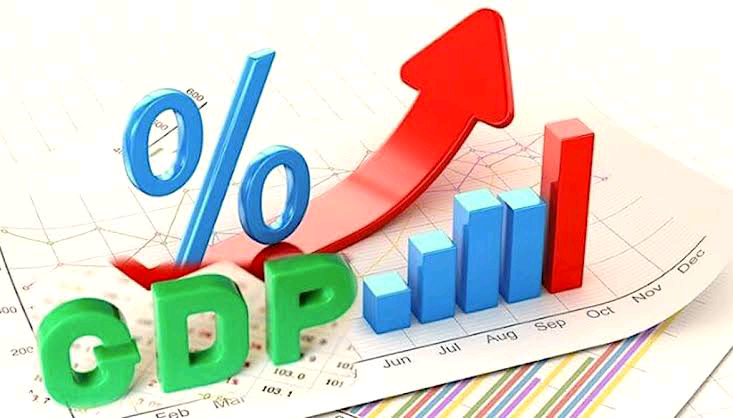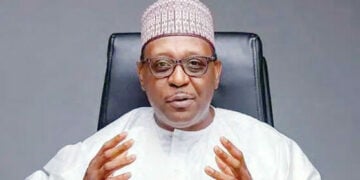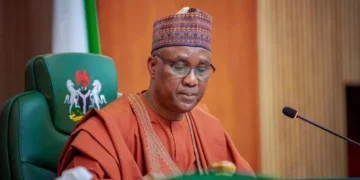Nigeria’s Gross Domestic Product (GDP) has been rebased to reflect a more accurate and contemporary measurement of economic activity, with the National Bureau of Statistics (NBS) announcing a significant expansion in the economy’s total size to N372.8 trillion as of 2024, up from N54.2 trillion under the old methodology.
The country’s bigger economy size has however elicited mixed reactions from economic analysts, operators and key industry players.
While some are quick to point out that the revised numbers do not translate to a sudden improvement in living standards, others commended the methodological rigour that went into the update, saying that it brings Nigeria’s economic statistics in line with its rapidly evolving reality and will support long-term investment and policy planning.
The revised figures, released on Monday, mark the outcome of the rebasing exercise that shifts the base year for GDP calculations from 2010 to 2019. The authorities said the update aligns Nigeria’s national accounting system with international best practices and provides a clearer picture of the country’s economic structure.
According to the NBS, the rebasing exercise captured the emergence of new industries and expanded coverage of informal and digital activities, creative industry, fintech, and other previously underrepresented sectors. As a result, the nominal size of Nigeria’s economy in 2019 was restated at N205.09 trillion, rising progressively to N372.82 trillion in 2024.
In real terms, the economy grew by 3.13 per cent year-on-year in the first quarter (Q1) of 2025, a notable improvement from 2.27 per cent recorded in the corresponding quarter of 2024. The performance was largely driven by the services sector, which contributed 57.5 percent to the aggregate GDP and grew by 4.33 percent during the period, the statistics bureau stated yesterday.
Within the rebased GDP framework, crop production emerged as the largest contributor to the economy, accounting for 17.58 per cent of total output. This was closely followed by trade, at 17.42 per cent, while real estate claimed the third spot, at 10.78 per cent, overtaking the historically dominant crude petroleum and natural gas sector, which now contributes 5.85 per cent.
The real estate sector’s leap ahead of oil reflects improved documentation and measurement of informal housing and land-related activities, a notable outcome of the expanded data collection and methodological overhaul employed during the rebasing process.
On a broader classification, the services sector retained its lead as the largest contributor to GDP, accounting for 53.09 per cent of the economy. This was followed by agriculture at 25.83 percent, and industry at 21.08 per cent, based on the 2019 benchmark.
In Q1 2025, while the services sector led growth, the industry sector also recorded a healthy expansion of 3.42 per cent, up from 2.35 per cent in Q1 2024. Meanwhile, the agriculture sector, which had contracted by -1.79 per cent in the same quarter of 2024) —rebounded slightly, growing by 0.07 per cent.
The GDP rebasing also introduced a new pricing structure that better reflects current market realities and consumption patterns. This update ensures that real GDP growth rates are not distorted by outdated price indices, thus offering a more realistic assessment of economic performance.
While the 2010 rebasing resulted in a 59.7 per cent increase in nominal GDP estimates, the current revision yields a more modest 41.7 per cent uplift, highlighting Nigeria’s growing maturity and diversification.
From a growth trajectory perspective, Nigeria’s economy recorded -6.96 per cent real GDP growth in 2020 amid the COVID-19 pandemic but recovered to 0.95 per cent in 2021, 4.32 per cent in 2022, 3.04 per cent in 2023, and 3.38 per cent in 2024.
These figures suggest a gradual but steady recovery, with Q1 2025 continuing the positive trend. The increase in growth from 2.27 per cent in Q1 2024 to 3.13 per cent in Q1 2025 points to growing resilience, especially in non-oil sectors.
Explaining the rationale behind the exercise, Statistician General of the Federation Adeyemi Adeniran said the rebasing was essential to provide more accurate, timely, and internationally comparable economic statistics. According to him, the previous base year of 2010 no longer adequately captured the structural changes and new economic activities that have emerged in the last decade.
“Rebasing GDP is a best-practice procedure endorsed by the United Nations System of National Accounts (SNA) to ensure statistical relevance,” Adeniran said, adding that the latest exercise involved collaboration with local and international stakeholders, including the World Bank and International Monetary Fund (IMF).
“This is a routine statistical exercise which is conventionally carried out every five years (between five and 10 years in most developing countries). As the official statistics office, the NBS has conducted its work in providing data using the best methodology available to us, in line with international standards,” he stated.
A major component of the rebasing effort was the development of a new Supply and Use Table (SUT) covering 217 products across 46 economic activities. The process also included data drawn from major national surveys, such as the National Living Standards Survey (NLSS), the National Agriculture Sample Census, and the National Business Sample Census.
There had been commentaries to the fact that, if released, the new GDP framework would have implications for Nigeria’s economic ranking on the continent and globally.
The nominal increase would improve the perception of the economy’s size. Policymakers like the monetary and fiscal authorities are expected to focus on leveraging the revised data for more targeted growth interventions.
As Nigeria navigates a complex macroeconomic environment in 2025, the rebased GDP offers a critical baseline for policy, investment, and development strategies, marking a pivotal step in the country’s quest for inclusive and data-driven economic growth.
Analysts say the new GDP figures could influence a wide range of economic decisions, from fiscal planning to debt sustainability assessments and sectoral policy targeting.
“The rebased GDP gives a more accurate representation of economic activities in Nigeria. It’s a good step that will improve confidence in our data and help government and investors make better-informed decisions,” said a Lagos-based economist, Stephen Kanabe.
Economics lecturer at the University of Benin, Professor Hassan Oaikhenan, welcomed the rebasing exercise and expressed hope that it would improve the credibility of Nigeria’s economic statistics on the global stage.
“This rebasing is long overdue and crucial for aligning our national accounts with current realities. It reflects new growth areas like fintech and digital services that were previously underestimated. For policymakers, it’s a chance to redirect focus toward sectors that are truly driving economic activity,” he said.
Numbers Not Matching Current Realities
Dr. Emeke Okengwu, chief executive of AntHill Concepts Ltd., and member of the Board of Economists, NATIONAL ECONOMY, said: “What is important is not the figures that have been released, which are all technical materials. The real side of it is what you call the empirical proof on ground. If you are talking about gross domestic product, you are talking about productivity levels.
“While you match whatever statistics that have been done, you also need to look at statistics from the Manufacturers Association of Nigeria (MAN). If the statistics from MAN is anything to go by we have more industries that are closing shop than are opening. And this is as a result of a myriad of factors. Specific among them is that industrialisation that used to be closely linked to rural development has become an urban thing. Many of these industries that functioned based on nearness to raw materials are now considering safety over and above access to raw materials as primary factors.
“I don’t think we are doing so well in our real GDP statistics because if you look at the statistics coming from MAN and the Chambers of Commerce, they show that there are a lot more companies closing than are opening shops.
“On the other hand, we need to commend the fiscal and monetary policies of the government that have led to the clear and sustained reduction in rates.”
Final Outcome Not As Dramatic As We Expected
For the chief executive of the Centre for the Promotion of Private Enterprise (CPPE) , Dr Muda Yusuf, the rebased GDP is reflective of the economy and would likely see a rise in the country’s rating.
Noting that the while expectations had been very high with respect to the GDP rebasing, he said the final outcome was not as dramatic as many had expected.
“But the good thing is that we have a clearer picture of the structure of the economy. We know that the economy is bigger than what we have been quoting it to be, but not as big as some analysts have actually expected. We have also seen some structural changes in the economy.
“For instance, we are seeing a much bigger role of the real estate in the economy. The real estate is now occupying the third position in terms of contribution to GDP, which is quite significant.
“The real estate has displaced crude oil as number three, and the ICT sector has also grown significantly, and we have also seen a much bigger increase in the share of agriculture and services sector in the economy, which means that the share of industries has reduced.”
According to Yusuf, the positive aspect of the exercise is that there is a clearer picture in terms of contributions, in terms of structure of the economy.
“And of course, the economy is slightly bigger than what it used to be. This will also improve our ranking in the global economy and the African economy.
Right now we are number five or so but this will improve our ranking. By the time we convert this to dollars, we should be seeing something close to maybe $300 billion or so, so it is a good development. We welcome it,” he said.
The economist also spoke about the new structure of the GDP.
He said, “Before the rebasing, agric was contributing 22.12%, post-rebasing, we are now seeing about 26% or 25.8% for agriculture industry. Before the rebasing industry was accounting for 27.7% of GDP. Now industry is accounting for 21.08% of GDP. The services sector before rebasing was 50.22%, now with the rebasing, it now contributes 53.09%, so you can see the shifts in the structure of the economy.”
He noted that the services sector was rising faster than the real sector of the economy.
Stakeholders Laud exercise
Following the recent successful rebasing of Nigeria’s Gross Domestic Product (GDP) by the National Bureau of Statistics (NBS), the Nigeria Employers Consultative Association (NECA) has praised this development, calling it a significant move towards clearer economic insights and improved policy-making.
NECA director-general Adewale-Smatt Oyerinde discussed the importance of the new data and pointed out that the rebased GDP provides a more thorough and realistic view of Nigeria’s economic landscape.
“It highlights several hidden and underreported sectors that are quietly contributing to growth and job creation in our economy,” he said.
Mr. Oyerinde further stated that by changing the base year from 2010 to 2019, the updated figures reflect important shifts in the economy’s structure, particularly the growth of the real estate, telecommunications, and trade sectors. “This rebasing showcases the vibrancy of the Nigerian economy, especially within the informal and service sectors that often go unnoticed in official reports,” he noted.
He also stressed that these new figures would influence key macroeconomic indicators like the debt-to-GDP ratio, investment-to-GDP ratio, and tax-to-GDP ratio.
“This gives policymakers a stronger basis to evaluate fiscal sustainability, revenue performance, and national productivity.”
The NECA boss noted that the change in sector rankings, with real estate surpassing crude oil and natural gas, serves as a wake-up call for economic diversification.
“Employers and investors can now clearly see where real growth is occurring, which is vital for private sector planning and aligning government policies,” Oyerinde noted, adding that the rebasing effort will boost Nigeria’s global competitiveness and appeal to investors.
“With more accurate data, better decisions can be made. International investors are looking for transparency and up-to-date metrics,” Oyerinde concluded, adding that the association was looking forward to collaborating with government institutions to leverage this data for inclusive, job-rich, and sustainable economic growth.
“This is not just a statistical update; it is an opportunity to shape smarter economic policies and unlock Nigeria’s full industrial and labour potential,” he said.





